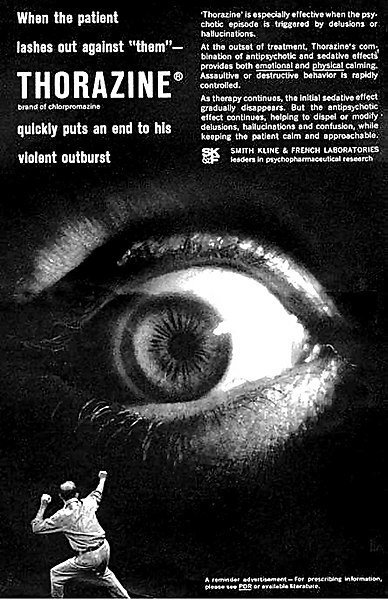#SchizoChat
#SchizoChat
#SchizoChat
#SchizoChat
#SchizoChat
#SchizoChat
#SchizoChat
#SchizoChat
#SchizoChat
#SchizoChat
#SchizoChat
#SchizoChat
I am absolutely knocked out by antihistamines-- if they're related to antipsychotics that makes sense I guess!
#SchizoChat
#SchizoChat
#SchizoChat

#SchizoChat
#SchizoChat
#SchizoChat
#SchizoChat
#SchizoChat
Do we desire it? Or do we feel aversion to it? Those are dopamine messages!
#SchizoChat
But we know that “typical” antipsychotics block dopamine reception and we know they work for some patients, somehow.
#SchizoChat
Dr. Torrey says: “The bottom line is that we really don’t know how they work. But then, we don’t yet know how aspirin works, either.”
#SchizoChat
According to Wikipedia it is “an effective drug, although not a perfect one.”
There are many possible side effects—weight gain, decreased blood pressure, sedation… and many more.
#SchizoChat
How nasty, you ask?
They can be life threatening or permanently disabling
#SchizoChat
They are rare but they are possible.
#SchizoChat
Perhaps more importantly, like any mental health medication these drugs (with one possible exception) also have the possibility of increasing suicidal thoughts/ideation. It’s super dangerous and patients/caretakers need to watch for it.
#SchizoChat
#SchizoChat
Well, check out the numbers for yourself!
#SchizoChat
These can be NASTY!
Others I put up with because the benefits outweigh the costs. That’s for you and your psychiatrist to decide.
#SchizoChat
We break them into two categories: first-gen (or “typical”) and second-gen (“atypical”).
#SchizoChat
These first-gen “typical” antipsychotics work, for the most part, on those dopamine receptors (although newer research continues to teach us about what these drugs actually do).
#SchizoChat
Prolizin, Haldol, Loxitane, Trilafon, Mellaril, Navane, and Stelazine. Good baby-name list. #SchizoChat
As soon as I get a steady prescription I’ll likely switch because I can’t keep a good schedule.
#SchizoChat
#SchizoChat
#SchizoChat
Second-gen antipsychotics likely aren’t better than first-gen and they probably work on similar pathways.
Patients need to find the one that fits them best from either category.
#SchizoChat
They’re also great baby names.
#SchizoChat
Maybe.
#SchizoChat
I take a total of five different medications a day. I’ll talk about that more next week!
#SchizoChat
How?
#SchizoChat
Well, clozapine/Clozaril is the only antipsychotic we know of that reduces the rate of suicidal behavior.
So why isn’t everyone on this drug?
#SchizoChat
Approximately 1% of the patients on this drug develop these symptoms.
#SchizoChat
If you are prescribed this drug (at least in the U.S.) you are required to do weekly blood tests initially then monthly blood tests afterward.
#SchizoChat
#SchizoChat
Here is more info in case you are interested:
vice.com/en_us/article/…
#SchizoChat
They work in different ways, they cost different amounts… bottom line, patients/caretakers need to find one that is right for them, and it often takes a depressingly long period of trial-and-error.
#SchizoChat
So patients need to keep checking in to make sure that their drugs are working! So much work.
#SchizoChat
#SchizoChat
I can’t blame people for being hurt, scared, angry, and everything in-between!
#SchizoChat
One drug may be perfect for one patient, awful for another
#SchizoChat
Running the gauntlet of constantly trying new drugs is exhausting and you may never find an answer.
It sucks.
#SchizoChat
How much is this drug hurting vs. helping?
Again, ideally, this would be up to the patients and their psychiatrists, but that brings me to my next point: consent.
#SchizoChat
I luckily fall into this category (for now)
#SchizoChat
Many of us deal with memory loss, heavy sedation, problems with sleep schedules—it makes it very hard to remember to take the drugs on time and correctly (with food, without food, at the right time, etc.)
#SchizoChat
#SchizoChat
While it is often viewed as “stubbornness” or “denial,” it is not—it is literally the result of illness-based brain changes.
#SchizoChat
Other times it can be much more long-term—it depends on the patient.
#SchizoChat
Not only do you have to decide that they are ill (definitely not error-proof) but you have to treat it.
#SchizoChat
The careful balance of weighing costs and benefits is no longer up to the patient
#SchizoChat
The week after next my theme will be “Asylums and Halloween,” talking about the realities and representations of institutionalization
#SchizoChat
#SchizoChat
My mom is one of those people that just doesn’t like ingesting drugs.
How do we treat them?
#SchizoChat
Patients may believe that they are being poisoned by spies or followed through datachips in their pills.
They may resist taking them.
#SchizoChat
Does the emotional/psychological cost of taking the medication outweigh the benefit?
If so, it definitely warrants a serious conversation about the use of antipsychotics.
#SchizoChat
second part:
#SchizoChat
In 2010 sales of those 18 antipsychotic drugs totaled $16 BILLION. With a “b.”
They are often Big Pharma companies’ best-selling drugs.
#SchizoChat
These are a product.
A product that patients desperately need, but also a product lining company pockets.
#SchizoChat
Patents usually last for 20 years, an exhaustingly long time to wait for a cheaper generic.
#SchizoChat
My psychiatrist submitted my last prescription with the words: “fingers crossed! If not approved it’ll be $6000/month." You know, reasonable!
#SchizoChat
I couldn’t get them to work. #SchizoChat
#SchizoChat
Plus, schizo- symptoms often make it hard to hold down a regular job. Without a consistent paycheck and employer insurance, antipsychotics are often just out-of-reach.
#SchizoChat
A lot of the problem is legislative—drug companies need to be help accountable and need to make drugs more accessible.
We also need to raise awareness—if folks think this is important they’ll fund research to find better drugs!
#SchizoChat
They may be working super well for you and that is great!
It’s only been three weeks but my Latuda has basically rendered me psychosis-free and has significantly raised my mood…so far.
#SchizoChat
They may not help at all or they may have awful side effects.
In general, everyone’s experience is different and we can’t discount each other’s experiences, good or bad.
#SchizoChat
#SchizoChat
As usual, I recommend Dr. Torrey’s Surviving Schizophrenia, where I pulled a lot of these stats (to be honest the rest were generally just Google searches).
Ask me more questions please!! And give me your perspective!!
#SchizoChat
I’m slowly building a website, a letter-writing campaign, and (hopefully) an Etsy store.
In the meantime, I have bracelets! DM me a shipping address.
The more people thinking about schizo the closer we are to educating them and ending the stigma!
#SchizoChat
I forgot to mention, the bracelets are first-come-first-serve. I have, like, five. If enough folks are interested I can buy more but I don't have the cash so they'd be like $5 each.
Next week’s topic will be “other treatments,” and the week after will be “Asylums and Halloween,” as it is the day before my favorite holiday.
Tweet you then!










